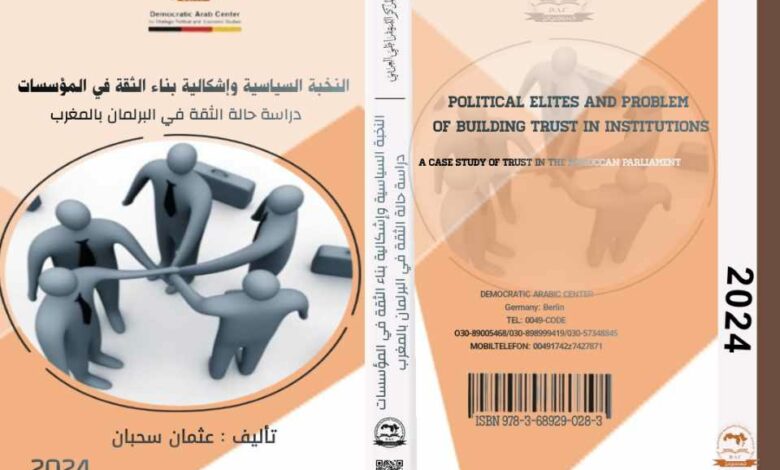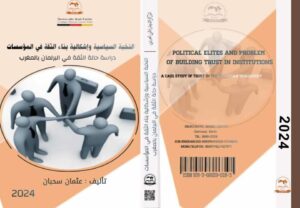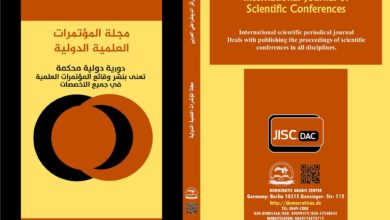النخبة السياسية وإشكالية بناء الثقة في المؤسسات دراسة حالة الثقة في البرلمان بالمغرب
Political Elites and Problem of Building Trust in Institutions: A Case Study of Trust in the Moroccan Parliament

تأليف : عثمان سحبان
نسخة “pdf”-
النخبة السياسية وإشكالية بناء الثقة في المؤسسات دراسة حالة الثقة في البرلمان بالمغرب
الطبعة الأولى “2024″ –من كتاب: :-
النخبة السياسية وإشكالية بناء الثقة في المؤسسات دراسة حالة الثقة في البرلمان بالمغرب
جميع حقوق الطبع محفوظة #المركز_الديمقراطي_العربي ولا يسمح بإعادة إصدار هذا الكتاب أو اي جزء منه أو تخزينه في نطاق إستعادة المعلومات أو نقله بأي شكل من الأشكال، دون إذن مسبق خطي من الناشر .
تقديم :-
يهدف هذا الكتاب إلى مساءلة العلاقة بين سلوك وأداء النخب السياسية البرلمانية وتراجع ثقة المواطنات والمواطنين في البرلمان، وكيف يمكن أن تكون هذه النخب عاملا محددا إما في تراجع أو بناء وتعزيز الثقة في المؤسسات التمثيلية داخل الدولة. يناقش القسم الأول من الكتاب فكرة أن النخب السياسية هي حجر الزاوية في النظام السياسي المغربي، مستعرضا آليات إنتاج هذه النخب وثنائية تمثيلها على المستويين المحلي والوطني، ويبين أدوار هذه النخب مركزا على الشرعنة، الوساطة، التوافقية، وتفعيل المشاركة السياسية، ويستكشف مختلف التفاعلات السوسيوسياسية للنخبة السياسية ومحدداتها النظرية.
يبحث الكتاب في موضوع الثقة السياسية كرأس مال اجتماعي ويقيّم أهميتها ومؤشرات قياسها، مشيرا إلى الأهمية الاجتماعية والسياسية للثقة ودور النخب في بنائها، ويناقش الكتاب كيف يمكن للأحزاب السياسية أن تساهم في ارتفاع أو تراجع الثقة السياسية، ويحلل العوامل التي تساهم في بناء أو هدم الثقة السياسية، بما في ذلك الأداء المؤسساتي والعوامل الثقافية.
في القسم الثاني، يركز الكتاب على النخبة البرلمانية ومساهمتها في بناء الثقة في البرلمان المغربي، مستعرضا واقع الثقة في البرلمان لدى الرأي العام المحلي بإقليم الجديدة كنموذج للدراسة، ويقدم تحليلا للخصائص السوسيوسياسية للنخبة البرلمانية والسمات العامة للعينة المستجوبة من المواطنين، ويفسر نتائج مؤشرات الثقة في البرلمان. بالإضافة إلى ذلك، يستعرض الكتاب تداعيات تراجع الثقة في البرلمان ويقدم رؤى حول آفاق بناء هذه الثقة، مشيرا إلى العزوف السياسي والنزعة الاحتجاجية كنتائج سلوكية لتراجع الثقة السياسية، ويسلط الضوء على دور المشاركة المواطنة والبرلمان الإلكتروني في تعزيز الثقة في البرلمان وتجديد الممارسة الديمقراطية.
ومن ثم، فموضوع هذا الكتاب يعتبر واحدا من المواضيع الواعدة في المغرب، خاصة في ظل الرهانات السياسية والاقتصادية والاجتماعية التي تعرفها المملكة، إذ من الصعب تحقيق تنمية شاملة ومستدامة وبناء دولة الحق والقانون أو دولة المؤسسات، والتأسيس لعمل سياسي ومؤسساتي مستقل ونزيه وديمقراطي في غياب علاقات مواطنة أساسها الثقة والمشاركة الجادة والفعالة في الحياة السياسية.
كما ترجع أهمية هذا الكتاب إلى أهمية هذه النخب في الحياة السياسية والبرلمانية المغربية الراهنة، كفاعل أساسي في العملية السياسية والديمقراطية، بالنظر إلى الأدوار التي يفترض أن تتحملها في توجيه الأحداث وتعزيز مسار الإصلاح الديمقراطي وتدعيم مكانة المؤسسات. علاوة على ذلك، فهذا الكتاب يساعد على تحديد عناصر الاستمرار والتغير في توجهات الرأي العام إزاء النظام السياسي بالمغرب من خلال المؤسسة التشريعية، والتعرف كذلك على نظرة المواطنين تجاه المؤسسات، تكون مفيدة للمهتمين بتطوير أداء هذه المؤسسات وزيادة فاعليتها وتجديد وتعزيز الثقة بها.
Abstract
The aim of this book is to explore the relationshipbetween the behaviour and performance of parliamentarypoliticalelites and the decline in citizens’ trust in parliament, and how theseelites can be a determining factor in either the declineor the building and strengthening of trust in representative institutions within the state. The first section of the book discusses the ideathatpoliticalelites are the cornerstone of the Moroccanpolitical system. It examines the mechanisms of production of theseelites and the duality of theirrepresentation at the local and national levels, outlines the roles of theseelitesfocusing on legitimation, mediation, consensus and activation of political participation, and explores the various socio-political interactions of politicalelites and theirtheoreticaldeterminants.
The book examines political trust as social capital and assessesits importance and indicators for measuringit, noting the social and political importance of trust and the role of elites in building it. The book discusses how political parties can contribute to the rise or decline of political trust and analyses the factorsthatcontribute to building or destroyingpolitical trust, includinginstitutional performance and cultural factors.
In the second section, the book focuses on the parliamentaryelite and its contribution to building trust in the Moroccanparliament, examining the reality of trust in parliamentamong local public opinion in the province of El Jadida as a model for the study, analysing the socio-politicalcharacteristics of the parliamentaryelite and the generalcharacteristics of the sample of citizenssurveyed, and interpreting the results of the trust in parliamentindicators. In addition, the book examines the consequences of the decline in trust in parliamentand provides insights into the prospects for building this trust, pointing to politicalalienation and protest as behaviouralconsequences of the decline in political trust, and highlighting the role of citizen participation and e-parliament in increasing trust in parliament and renewingdemocratic practice.
This book is one of the mostpromising topics in Morocco, especially in light of the political, economic and social stakesthat the Kingdomisfacing, sinceitisdifficult to achievecomprehensive and sustainabledevelopment, to build a state of law and justice or a state of institutions, and to establish an independent, honest and democraticpolitical and institutionalwork in the absence of citizenship relations based on trust and serious and effective participation in political life.
The importance of this book isalso due to the importance of theseelites in currentMoroccanpolitical and parliamentary life, as a key actor in the political and democratic process, given the rolethey are supposed to play in guidingevents, promoting the path of democraticreform and strengthening the status of institutions. Moreover, this book helps to identify the elements of continuity and change in public opinion towards the political system in Morocco through the legislative institution, as well as the perception of citizenstowards the institutions, whichwillbeuseful for thoseinterested in developing the performance of these institutions, increasingtheireffectiveness, and renewing and strengthening confidence in them.
الناشر: المركـز الديمقراطي العربي للدراسات الاستراتيجية والسياسية والاقتصادية – ألمانيا – برلين
Democratic Arabic Center- Berlin – Germany





